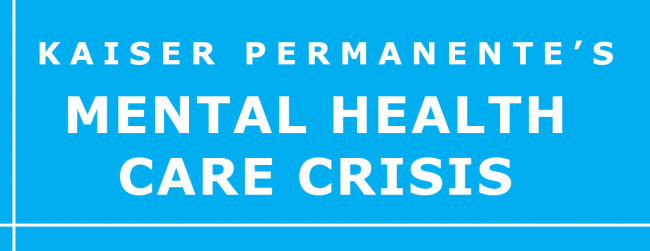Kaiser mental health care crisis garnering press coverage
Kaiser Permanente’s mental health care crisis is getting good press coverage. Two reporters in particular — Martin Espinoza of the Santa Rosa Press Democrat and Jon Brooks of KQED — have written thoughtful, in-depth stories that cover the crisis from different angles.
 Brooks has published two stories in recent weeks about Kaiser Permanente’s mental health care crisis on KQED’s website. His July 1 story dealt with Sonoma County Supervisor Shirlee Zane’s impassioned letter to Kaiser Permanente officials, in which she criticized the HMO for turning a blind eye to its deficiencies in mental health care and for scapegoating the clinicians who have worked together through their union, NUHW, to improve Kaiser’s psychiatric services. Zane also told Kaiser that she would reconsider her approval of Kaiser’s contract to provide health services for county employees.
Brooks has published two stories in recent weeks about Kaiser Permanente’s mental health care crisis on KQED’s website. His July 1 story dealt with Sonoma County Supervisor Shirlee Zane’s impassioned letter to Kaiser Permanente officials, in which she criticized the HMO for turning a blind eye to its deficiencies in mental health care and for scapegoating the clinicians who have worked together through their union, NUHW, to improve Kaiser’s psychiatric services. Zane also told Kaiser that she would reconsider her approval of Kaiser’s contract to provide health services for county employees.
Brooks interviewed many clinicians and patients for his July 17 story in which he focused on the pros and cons of group therapy vs. individual therapy.
On July 21, Brooks was interviewed by his colleague Mina Kim for the station’s California Report broadcast. Brooks spoke of Kaiser’s scheme to meet state requirements for timely initial appointments by shifting resources from follow-up appointment access — robbing Peter to pay Paul, as Brooks put it.
Brooks’ reporting followed a series of Press Democrat stories on the crisis by Martin Espinoza. The first covered NUHW’s call for a federal investigation into Kaiser’s failures in mental health care. The second covered Santa Rosa clinician Andy Weisskoff’s effort to draw attention to the crisis. The third interviewed Sonoma County Supervisor Shirlee Zane, whose husband committed suicide during a 42-day wait for an appointment with Kaiser Santa Rosa, where he sought treatment for panic disorder and major depression. And the fourth story covered Zane’s letter to Kaiser, which was prompted by Kaiser officials’ insensitive remarks in the previous stories. Zane criticized Kaiser for turning a blind eye to its deficiencies in mental health and for scapegoating
The Vallejo-Times Herald and Politico also covered NUHW’s call for a federal investigation.


